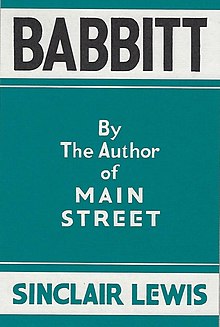 First edition cover | |
| Author | Sinclair Lewis |
|---|---|
| Language | English |
| Subject | American values |
| Genre | Satire |
| Publisher | Harcourt, Brace & Co. |
Publication date | 1922 |
| Publication place | United States |
| Media type | Print (hardcover) |
| Pages | 432 (paperback) |
| Preceded by | Main Street |
| Followed by | Arrowsmith |
| Text | Babbitt at Wikisource |
Babbitt (1922), by Sinclair Lewis, is a satirical novel about American culture and society that critiques the vacuity of middle class life and the social pressure toward conformity. The controversy provoked by Babbitt was influential in the decision to award the Nobel Prize in Literature to Lewis in 1930.[1] The novel has been filmed twice, once as a silent in 1924 and remade as a talkie in 1934.
The word Babbitt has entered the English language as a "person and especially a business or professional man who conforms unthinkingly to prevailing middle-class standards".[2][3]
- ^ Phelps, William Lyon/ "Sinclair Lewis and the Nobel Prize", The Washington Post (December 7, 1930)
- ^ Merriam-Webster
- ^ Strouf, Judie L. H. (2005). The literature teacher's book of lists. Jossey-Bass. p. 13. ISBN 0787975508.